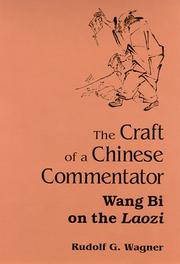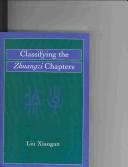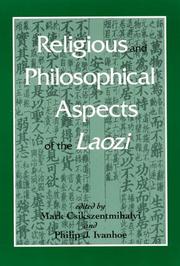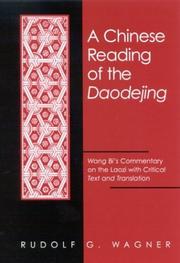| Listing 1 - 4 of 4 |
Sort by
|

ISBN: 0791493385 0585399298 9780585399294 9780791443958 0791443957 9780791493380 9780791443965 0791443965 Year: 2000 Publisher: Albany, NY : State University of New York Press,
Abstract | Keywords | Export | Availability | Bookmark
 Loading...
Loading...Choose an application
- Reference Manager
- EndNote
- RefWorks (Direct export to RefWorks)
The Laozi has been translated into Western languages hundreds of times over the past two hundred years. It has become the book of Chinese philosophy most widely appreciated for its philosophical depth and lyrical form. Nevertheless, very little attention has been paid to the way in which this book was read in China. This book introduces the reader to a highly sophisticated Chinese way of reading this Taoist classic, a way that differs greatly from the many translations of the Laozi available in the West.The most famous among the Chinese commentators on the Laozi—a man appreciated even by his opponents for the sheer brilliance of his analysis—is Wang Bi (226–249). Born into a short period of intellectual ferment and freedom after the collapse of the Han dynasty, this self-assured genius, in the short twenty-three years of his life, dashed off two of the most enduring works of Chinese philosophy, a commentary on the Laozi and another on the Book of Changes.By carefully reconstructing Wang Bi's Laozi text as well as his commentary, this book explores Wang Bi's craft as a scholarly commentator who is also a philosopher in his own right. By situating his work within the context of other competing commentaries and extracting their way of reading the Laozi, this book shows how the Laozi has been approached in many different ways, ranging from a philosophical underpinning for a particular theory of political rule to a guide to techniques of life-prolongation. Amidst his competitors, however, Wang Bi stands out through a literary and philosophical analysis of the Laozi that manages to "use the Laozi to explain the Laozi," rather than imposing an agenda on the text. Through a critical adaptation of several hundred years of commentaries on the classics, Wang Bi reaches a scholarly level in the art of understanding that is unmatched anywhere else in the world.

ISBN: 0892641061 047212739X 0472901346 9780472127399 9780472901340 0892641649 9780892641062 Year: 1995 Publisher: Ann Arbor, Michigan : University of Michigan Press,
Abstract | Keywords | Export | Availability | Bookmark
 Loading...
Loading...Choose an application
- Reference Manager
- EndNote
- RefWorks (Direct export to RefWorks)
The relationships, both historical and philosophical, among the Zhuangzi’s Inner, Outer, and Miscellaneous chapters are the subject of ancient and enduring controversy. Liu marshals linguistic, intertextual, intratextual, and historical evidence to establish an objectively demonstrable chronology and determine the philosophical affiliations among the various chapters. This major advance in Zhuangzi scholarship furnishes indispensable data for all students of the great Daoist text. In a lengthy afterword, Liu compares his conclusions with those of A. C. Graham and addresses the relationship between the Zhuangzi and the Laozi.
S12/0600 --- China: Philosophy and Classics--Zhuangzi --- Laozi. --- Zhuangzi. --- 莊子. --- Chuang-tzu. --- Lao-tzu. --- 老子. --- Zhuangzi. Nanhua jing. --- Laozi. Dao de jing.

ISBN: 0791441113 0791441121 9780791441121 0585092907 9780585092904 1438400128 Year: 1999 Volume: *5
Abstract | Keywords | Export | Availability | Bookmark
 Loading...
Loading...Choose an application
- Reference Manager
- EndNote
- RefWorks (Direct export to RefWorks)
Leading scholars examine religious and philosophical dimensions of the Chinese classic known as the Daodejing or Laozi.
Taoism --- Taoist philosophy. --- Filosofie [Taoïstische ] --- Philosophie taoïste --- Philosophy [Taoist ] --- Taoist philosophy --- S12/0500 --- S13A/0401 --- Philosophy, Taoist --- Philosophy --- China: Philosophy and Classics--Laozi and Taoism (incl. Daodejing) --- China: Religion--Popular religion: Taoism --- Laozi. --- Lao-tzu. --- 老子. --- China --- Lao Zi --- PHILOSOPHY, CHINESE --- LAOZI --- PHILOSOPHY --- Philosophy, Chinese --- Laozi --- Philosophy, chinese

ISBN: 0791489582 141753740X 9781417537402 079145181X 9780791451816 0791451828 9780791451823 9780791489581 Year: 2003 Publisher: Albany : State University of New York Press,
Abstract | Keywords | Export | Availability | Bookmark
 Loading...
Loading...Choose an application
- Reference Manager
- EndNote
- RefWorks (Direct export to RefWorks)
Presenting the commentary of the third-century sage Wang Bi, this book provides a Chinese way of reading the Daodejing, one which will surprise Western readers.
Wang, Bi, --- Laozi. --- Wang, Pi, --- Wang, Pʻil, --- Wang, Bee, --- Ō, Hitsu, --- 王弼, --- Wang, Fusi, --- Wang, Fu-ssu, --- 王輔嗣, --- Lao-tzu. --- 老子. --- S12/0500 --- China: Philosophy and Classics--Laozi and Taoism (incl. Daodejing) --- Taoism. --- Daoism --- Taouism --- Religions --- Tao --- Laozi. - Dao de jing --- Wang, Bi, - 226-249
| Listing 1 - 4 of 4 |
Sort by
|

 Search
Search Feedback
Feedback About UniCat
About UniCat  Help
Help News
News